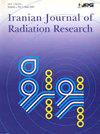The possibility of hormone-mediated PSA derangement in prostate cancer treatment
Q4 Health Professions
引用次数: 1
Abstract
Background: This study was designed to suggest the possibility of hormone-related derangement in salvage radiotherapy (SRT) a er radical prostatectomy in terms of prostate-specific an gen (PSA) control. Materials and Methods: Among 160 consecu ve prostate cancer pa ents who received radical prostatectomy, 34 with SRT between 2004 and 2012 were retrospec vely reviewed. The numbers of pa ents with pathologic T3-T4 stage, Gleason score 8-10, and posi ve resec on margin were 11 (32.4%), 10 (29.4%), and 17 (50.0%), respec vely. Median SRT dose was 64.8 Gy (range, 52.9-70.0 Gy) with 1.8-2.3 Gy frac ona ons. Biochemical failure -free survival a er SRT was counted and the median follow-up period was 32.5 months (range, 10-118 months). Results: A er SRT, the median me for PSA to decrease to less than 0.2 ng/mL was four months (range, 0-25 months). The three-year survival rate was 60.3%. On univariate analysis, preferen al hormone therapy (PHT) (p=0.022), higher PSA at SRT (p=0.005), and higher PSA a er surgery (p=0.003) were related to a shorter biochemical survival period. On mul variate analysis, lower PSA at SRT (p=0.016), higher radia on dose (p=0.007), and non-PHT (p=0.046) suggested a consistent PSA control. Conclusion: According to these results, low PSA values by hormonal interven on need to be reconsidered with a different way to look at the rela onship between the PSA and hormone therapy. SRT should be considered for postopera ve salvage treatment regardless of the hormone-related PSA values.激素介导的PSA紊乱在前列腺癌症治疗中的可能性
背景:本研究旨在探讨在前列腺特异性抗原(PSA)控制方面,补救性放疗(SRT)和根治性前列腺切除术中激素相关紊乱的可能性。材料与方法:回顾性分析2004 - 2012年间接受根治性前列腺切除术的160例前列腺癌患者,其中34例接受SRT治疗。病理T3-T4期11例(32.4%),Gleason评分8-10分10例(29.4%),切缘阳性17例(50.0%)。SRT的中位剂量为64.8 Gy(范围52.9-70.0 Gy),压裂剂量为1.8-2.3 Gy。统计无生化失败生存期(SRT),中位随访时间为32.5个月(范围10-118个月)。结果:在SRT中,PSA降至0.2 ng/mL以下的中位时间为4个月(范围0-25个月)。3年生存率为60.3%。单因素分析显示,激素治疗(PHT) (p=0.022)、SRT时PSA升高(p=0.005)和手术后PSA升高(p=0.003)与较短的生化生存期相关。在多变量分析中,SRT时PSA较低(p=0.016),剂量时辐射较高(p=0.007),非pht (p=0.046)提示PSA控制一致。结论:根据这些结果,需要重新考虑激素干预导致的低PSA值,并从不同的角度看待PSA与激素治疗的关系。无论激素相关的PSA值如何,都应考虑进行SRT治疗。
本文章由计算机程序翻译,如有差异,请以英文原文为准。
求助全文
约1分钟内获得全文
求助全文
来源期刊

Iranian Journal of Radiation Research
RADIOLOGY, NUCLEAR MEDICINE & MEDICAL IMAGING-
CiteScore
0.67
自引率
0.00%
发文量
0
审稿时长
>12 weeks
期刊介绍:
Iranian Journal of Radiation Research (IJRR) publishes original scientific research and clinical investigations related to radiation oncology, radiation biology, and Medical and health physics. The clinical studies submitted for publication include experimental studies of combined modality treatment, especially chemoradiotherapy approaches, and relevant innovations in hyperthermia, brachytherapy, high LET irradiation, nuclear medicine, dosimetry, tumor imaging, radiation treatment planning, radiosensitizers, and radioprotectors. All manuscripts must pass stringent peer-review and only papers that are rated of high scientific quality are accepted.
 求助内容:
求助内容: 应助结果提醒方式:
应助结果提醒方式:


